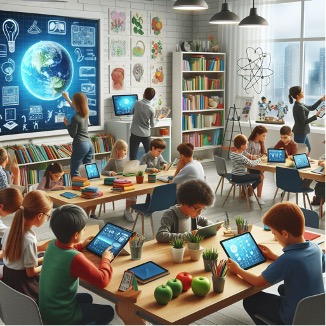Tailoring Education: Personalized Learning Empowered by AI

In pursuit of effectively and efficiently abandoning the "one size fits all" approach, educational systems are increasingly recognizing the diverse needs and learning styles of students. The use of multiple interaction modalities in school is crucial for catering to diverse learning styles and enhancing student engagement and understanding. By incorporating various sensory channels like visual, auditory, touching, reading/writing, and kinesthetic elements (i.e. VARK model), teachers can create a more inclusive and effective learning environment [1]. This approach acknowledges that students have different strengths and preferences when it comes to processing information, and by providing a variety of modes, learners can access the content in ways that are most effective for them.
With the advent of artificial intelligence (AI) in education, we are witnessing a transformative shift towards personalized learning. AI technologies enable the creation of learner-centered experiences that cater to the individual needs, preferences, and abilities of each student.
AI plays a pivotal role in diversifying interaction modalities within educational settings, offering a range of ways to engage with learning materials beyond traditional methods [2]. For example, gesture recognition technology allows students to use hand movements or body gestures to navigate through lessons, making learning accessible for those with mobility challenges or kinesthetic learning preferences. Additionally, the integration of touch interfaces into educational applications provides a hands-on approach to exploring concepts and accessing information, particularly benefiting learners with sensory processing disorders.
Moreover, AI-driven educational platforms like Kinems are at the forefront of this movement towards universal design for whole child development. Kinems learning gaming platform leverages AI technologies to create active and immersive learning experiences that engage students of all abilities. By integrating multiple modalities, including movement-based interactions, touch and touchless student interactions, audio feedback, and visual cues, Kinems platform ensures that learning is accessible and engaging for every learner. Through the platform's customization features, teachers can tailor game-based learning activities to each student's unique needs, promoting personalized learning and supporting the principles of universal design for learning.
By incorporating AI-driven technologies, educational platforms such as Kinems can provide tailored support for whole child development, effectively supporting the implementation of MTSS (Multi-Tiered System of Supports) and addressing not only academic needs but also socio-emotional and physical growth. This allows for the effective and efficient implementation of a tiered system of support, with interventions becoming more intensive as student needs increase.
- Tier 1: Core Instruction - This serves as the foundation of the MTSS framework, delivering high-quality instruction and evidence-based practices to all students.
- Tier 2: Targeted Interventions - Small group interventions are offered to students who require additional support beyond Tier 1.
- Tier 3: Intensive Interventions - Individualized interventions are provided to students who have not responded to Tier 1 and Tier 2 interventions.
This comprehensive approach ensures that every aspect of a student's learning journey is supported, fostering inclusivity and equity in education.
Let's harness the power of AI to facilitate a more inclusive and equitable educational experience, where every student has the opportunity to thrive and reach their full potential.
References
- Lynde Tan, Katina Zammit, Jacqueline D'warte, and Anne Gearside (2020). Assessing multimodal literacies in practice: A critical review of its implementations in educational settings. Language and Education 34, 2 (2020), 97-114.
- Fei, N., Lu, Z., Gao, Y., Yang, G., Huo, Y., Wen, J., Lu, H., Song, R., Gao, X., Xiang, T., Sun, H., & Wen, J.-R. (2022). Towards artificial general intelligence via a multimodal foundation model. Nature Communications, 13(1).